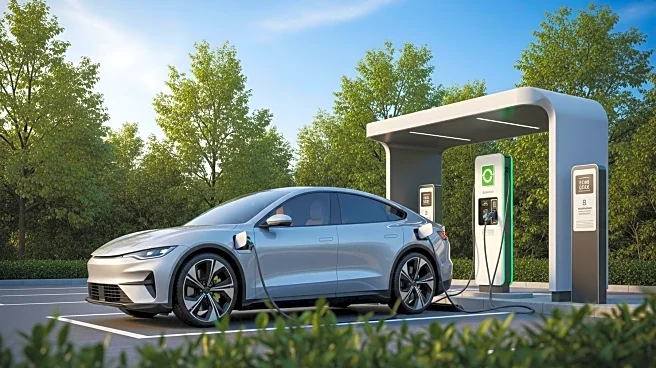What is the story about?
What's Happening?
South Africa's national electricity utility company, Eskom, has launched its first fleet of electric vehicles (EVs) as part of its commitment to sustainable transport and reducing carbon emissions. The initiative, led by Eskom's Distribution Division, marks a significant step towards a cleaner energy future for the country. The launch included interactive demonstrations and test drives, showcasing the benefits of EVs such as lower emissions and reduced operating costs. Eskom has installed 10 charging stations across various sites to support this transition, with plans to electrify its entire fleet by 2040. The company has already received 20 EVs, with an additional 100 expected soon, primarily for use in its Distribution and Generation Divisions.
Why It's Important?
Eskom's move to adopt electric vehicles is a critical development in South Africa's efforts to combat climate change and transition to sustainable energy solutions. By integrating EVs into its operations, Eskom is not only reducing its carbon footprint but also setting a precedent for other large fleet operators in the country. This shift could stimulate the local EV market, create jobs, and drive innovation in the automotive and energy sectors. Additionally, Eskom's commitment to expanding charging infrastructure and developing smart charging systems could make EV ownership more accessible and affordable for the public, further promoting the adoption of clean transportation.
What's Next?
Eskom plans to continue expanding its EV fleet and charging infrastructure, with a target to fully electrify its Distribution Division by 2035. The company also aims to roll out 55 public EV charging stations over the next two years, facilitating broader adoption of electric vehicles. As Eskom progresses with its e-mobility strategy, it will likely engage with government and industry stakeholders to address challenges such as high import duties on EVs, which currently hinder market growth. The success of Eskom's initiative could influence policy changes and encourage other sectors to embrace electric mobility.
Beyond the Headlines
Eskom's transition to electric vehicles highlights the broader implications of sustainable transport on South Africa's economy and environment. By reducing reliance on fossil fuels, the initiative supports the country's goals for a low-carbon future and aligns with global efforts to mitigate climate change. Moreover, Eskom's strategy could serve as a model for other African nations, demonstrating the potential benefits of integrating EVs into public and private fleets. The move also underscores the importance of collaboration between utility companies, government, and industry players in driving the adoption of clean energy technologies.














